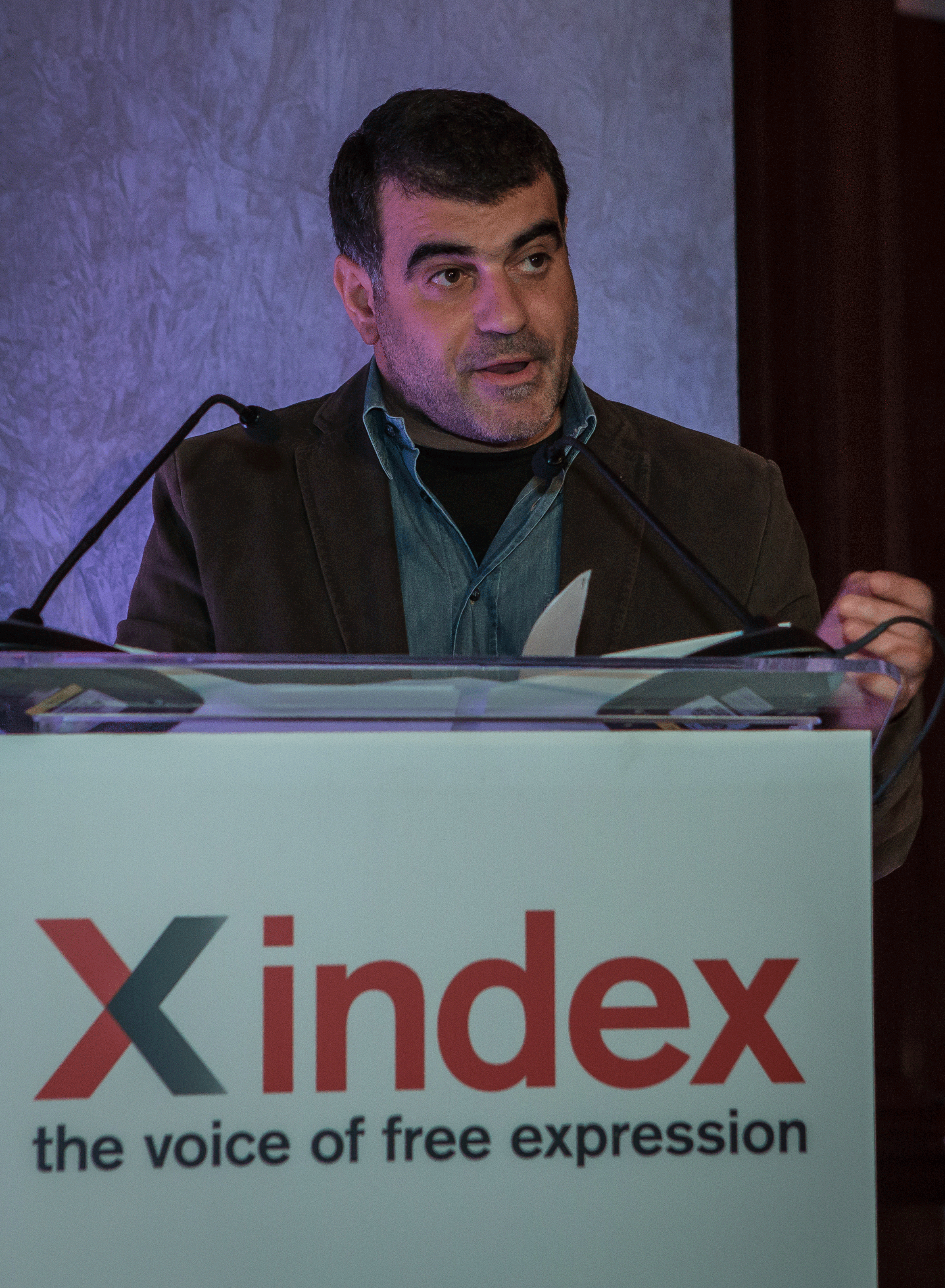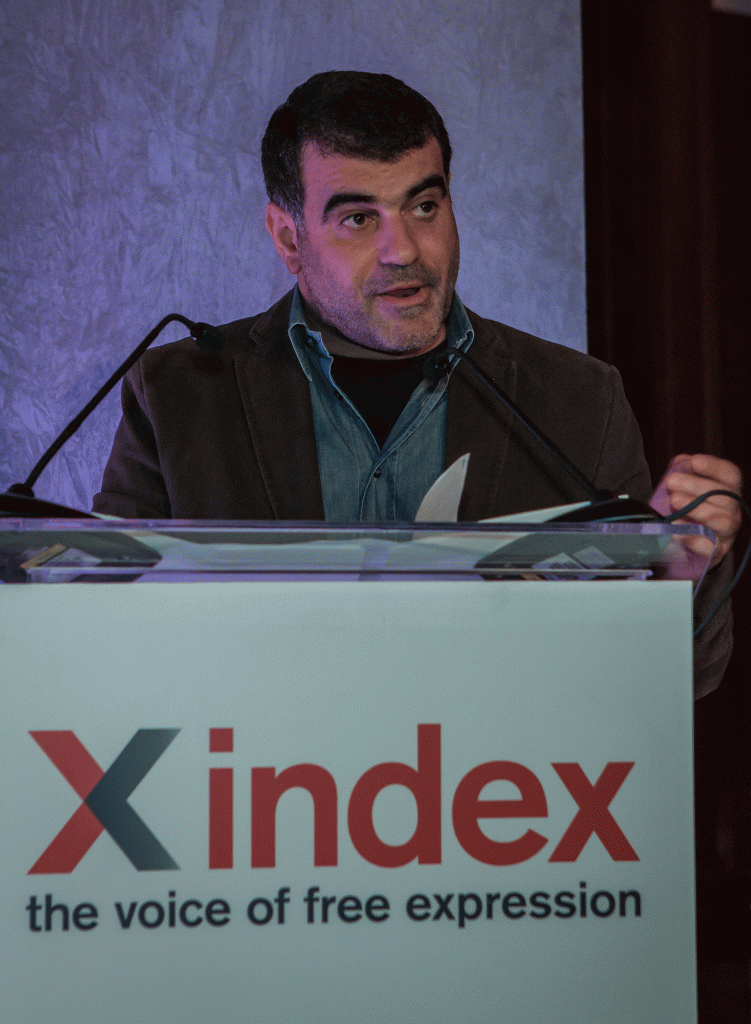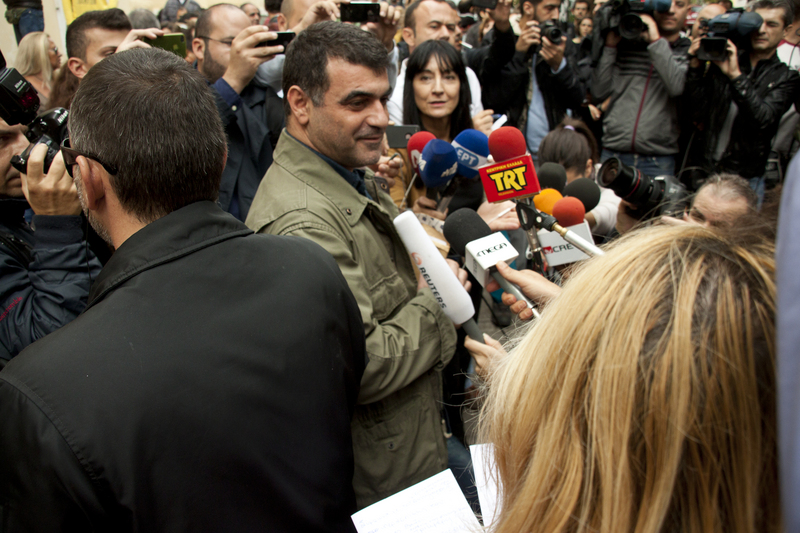26 Apr 2017 | Digital Freedom, Europe and Central Asia, France, Greece, Mapping Media Freedom, News and features, Russia, Ukraine
[vc_row][vc_column][vc_column_text]
Each week, Index on Censorship’s Mapping Media Freedom project verifies threats, violations and limitations faced by the media throughout the European Union and neighbouring countries. Here are recent reports that give us cause for concern.
Nikolay Andruschenko, an investigative correspondent for weekly newspaper Novyi Petersburg died on 19 April after being subjected to two brutal assaults in March, Open Russia reported.
Alevtina Ageyeva, the director of Novyi Peterburg, told Mapping Media Freedom that on 9 March, two unknown individuals approached him near his house and demanded that he hand over documents and materials relating to an ongoing investigation into abuse of power by police officers.
When Andruschenko refused to cooperate, they hit him several times in the head and ran away. The journalist refused to file a complaint to the police.
The second assault took place a few days later. According to Ageyeva, she was called by the Mariinskaya hospital and told that Nikolay Andruschenko was in a critical state and being treated in the intensive care unit. He was found unconscious with a brain injury near his apartment.
Despite undergoing surgery he never recovered.
Although the local police have opened an investigation, Ageyeva doubts it will be conducted properly because of Andruschenko’s history of investigating cases of police corruption.
She is convinced that both assaults are related to Andruschenkov’s work as an investigative reporter.
Two reporters for Buzzfeed News, David Perrotin and Paul Aveline, were physically prevented filming a meeting with French presidential candidate Francois Fillon on 17 April.
The journalists were filming two people who had interrupted Fillon’s meeting by shouting “Give the money back!” and were detained by the police when members of the candidate’s security staff physically prevented them from filming.
Guards first grabbed David Perrotin, pulling him by the collar, physically threatened him and demanded that he delete his video. A fuard then grabbed Aveline’s phone to prevent him from filming the scene.
At this point, according to Buzzfeed, a member of Fillon team said: “Throw them out.” It was only when the two journalists said they would write an article on the incidents that the members of the security team stopped threatening them.
During the same meeting, journalist Hortense Gerard, who works for BFMTV, was spat on. She later tweeted a photo of her sleeve covered in spit.
Independent newspaper Novaya Gazeta has received “direct threats addressed to its journalists” following publications on harassment of gay people in Chechnya according to a statement they released.
It says: “On 1 April 2017, Novaya Gazeta wrote on mass detainment and torture of Chechen residents who were suspected of being homosexual. We know the names of three persons murdered and we know that the number of those who were killed is much higher.(…)”
The backlash in Chechnya has left the entire staff of the newspaper fearful, the Guardian reported.
According to official data, on 3 April around 15,000 people attended an urgent meeting of representatives from the republic’s Muslim communities in the central mosque in Grozny, the capital of Chechnya.
During the meeting, Adam Shakhidov, an adviser to the head of the Chechen Republic, Ramzan Kadyrov, publicly accused the editorial staff of Novaya Gazeta of defamation and called them “enemies of our religion and our motherland”. This was broadcast live by a local TV channel and led to aggressive comments on social media.
After the meeting, a resolution was accepted. The second paragraph states the following: “The centuries-old traditions of Chechen society, the dignity of Chechen men, and our faith have all been insulted, and we promise that those behind it will face reprisals, whoever they are and wherever they are.”
Novaya Gazeta has called on the Russian authorities to prevent the hate speech directed at journalists for doing their jobs. When Novaya Gazeta’s statement was published online, its website crashed and staff are convinced this was due to a DDoS attack.
The backlash was sparked by an 1 April story from reporter Elena Milashina and her colleague Irina Gordienko. In March, Milashina had discovered evidence that gay men were being detained, tortured and even killed in an anti-homosexual purge in Chechnya.
Milashina spoke to The Washington Post on Friday 14 April from an undisclosed location and said she was thinking of leaving the country because of safety concerns.
Unidentified assailants shot at journalists from investigative program Slidstvo.Info on 14 April. The journalists were filming the estate of oligarch Rinat Akhmetov around Kyiv, the Institute of Mass Information reported.
“Our reporters Maxim Opanasenko and Kirill Shapar were filming a new estate near Kyiv which belongs to Rinat Akhmetov,” Slidstvo.Info reported.
Unidentified individuals shot a meter and a half above the car where Slidstvo.Info journalists were seated, Maxim Opanasenko told IMI. “I didn’t see the gunman. We suspect this was intended to scare us because they saw our drone,” the journalist said.
He added that the journalists are planning to investigate who the shooters were. No journalists were injured according to the IMI report.
Journalist and publisher Kostas Vaxevanis was arrested following a libel lawsuit against him filed by Lina Nikolopoulou, who is married to Bank of Greece Governor Yiannis Stournaras, Naftemporiki newspaper reported.
On 9 April Vaxevanis published an article in the weekly newspaper Documento about Nikolopoulou, who he claimed had received up to €400,000 of state money for medical and pharmaceutical lobbying and conference work and Stournaras presence in these conferences as a lecturer.
Vaxevanis alleges that contracts for these services were awarded to Nikolopoulou without being offered for public tender.
“The Stournaras family is not struggling in a legal battle, as it pretends. Mr and Mrs Stournaras struggle for their survival. They are trying to cover the way they act and operate,” Vaxevanis wrote in a statement asking for support.
The party leading the Greek government, Syriza, issued a statement stressing that the lawsuit “directly challenges journalism and press freedom” and adding that “the report raises some critical questions about the public health area, which require serious and documented answers”.
Vaxevanis was released later the same day.
[/vc_column_text][/vc_column][/vc_row][vc_row][vc_column][vc_column_text]
Click on the bubbles to view reports or double-click to zoom in on specific regions. The full site can be accessed at https://mappingmediafreedom.org/[/vc_column_text][/vc_column][/vc_row][vc_row][vc_column][vc_basic_grid post_type=”post” max_items=”4″ element_width=”6″ grid_id=”vc_gid:1493112590515-3ca2c0ad-ff59-8″ taxonomies=”6564″][/vc_column][/vc_row]
20 Apr 2015 | Greece, mobile, News and features

Kostas Vaxevanis won the 2013 Index on Censorship Journalism award for his investigative journalism through his work on the magazine Hot Doc. On 30 March 2015 he was convicted of criminal defamation for his reporting on banking irregularities in Greece and given a 26 month suspended sentence.
The justice system of Greece is often compared to a very thin fishing net, which catches the small fish, but which allows the bigger, stronger fish to break free.
It is a widely-held belief in Greece that there is a lack of justice administered by the country’s judicial system, and this belief is confirmed if one looks at recent history.
None of the major scandals of recent years — ranging from that of the Athens Stock Exchange to the scandal involving judges who conspired in the rigging of court cases — resulted in any guilty verdicts.
A few days ago, the Greek justice system sentenced former finance minister Giorgos Papakonstantinou to a mere 12 months’ imprisonment for his removal of names from the so-called Lagarde List of alleged Greek tax evaders with Swiss bank accounts, while he was not convicted for the most serious charges against him, namely, his inaction with regard to the individuals named on the list. However, this paradoxical situation, in which the Greek justice system charged and attempted to prosecute me on two occasions over the publication of the Lagarde List but did not sentence the government minister who concealed it, does not stop here. At the same time that a Greek court issued a paltry 12 month prison sentence to Papakonstantinou, a different court sentenced me to a 26 month suspended sentence, following charges that were filed against me by one of Greece’s major oligarchs, businessman Andreas Vgenopoulos.
Investigative reports which were publicised in the magazine which I publish, Hot Doc, revealed that Andreas Vgenopoulos had purchased the Cyprus-based Marfin Bank, which he then utilized in order to provide capitalization to other business interests of his and to those of his fellow oligarchs. According to the Cypriot government, Vgenpoulos’ actions with Marfin Bank was one of the main factors which resulted in the collapse of the country’s economy.
All of the reports which were published in Hot Doc were derived form official documents from the parliament of Cyprus, from Cypriot prosecutors, from Greek courts, and from the central banks of Greece and Cyprus. On the basis of documentation, anti-corruption prosecutors were obliged to launch an investigation regarding the financial activities of Vgenopoulos.
Even though this investigation is still in progress, along with a parallel investigation being conducted by Cypriot authorities, who have also issued a warrant for the freezing of Vgenopoulos’ assets totaling €2.4 billion, I was tried and sentenced by a Greek court on charges of libel. In court, I provided documentation from the vice prosecutor of the Greek Court of Appeals, who was requesting that Greek authorities investigate Vgenopoulos on allegations of bribery and money laundering based on evidence held by Cypriot authorities. Despite this, I was found guilty and issued a sentence that is greater than that issued by the Greek judicial system to a former Greek government minister, Giorgos Papakonstantinou.
In contrast to the standards of European law and European court decisions, which have made it clear that journalists are obligated to maintain a critical stance and, often, a strong and aggressive tone towards public figures, the Greek court which tried me concocted “malicious intent” on my part. Indeed, it is notable that the prosecutor, who was the same individual which had requested that I be sentenced for my revelation of the Lagarde List, on the basis of an unprecedented assertion: that I am “a very good journalist”, which means that my actions were undertaken “with malicious intent, and not out of ignorance”. This is unprecedented in global legal history.
Following my sentencing, numerous international organizations and actors responded, including the OSCE and the International Federation of Journalists, but once again, the only reaction in Greece was a guilty silence. At the present time, I am personally facing, along with Hot Doc magazine, no less than 42 different criminal cases and lawsuits. These are charges filed by politicians and oligarchs, whom we have investigated as part of our journalistic responsibilities. None of these individuals have officially responded to any of our revelations, as public figures are obliged to do.
Instead, they have resorted to legal means while attempting to influence public opinion by saying that they “will punish the slanderer in court”. In this way, they avoid responding to the revelations made against them and employ the justice system in their favour, to hold journalists hostage. It should be noted that Hot Doc’s legal bills for all of these different cases have surpassed €100,000.
The ultimate aim of this coordinated effort of charges and lawsuits against me and my magazine is to force us to reach a settlement, or to otherwise lead to our economic obliteration. It is rare for a journalist to challenge a coordinated and corrupt system, which also holds influence over specific individuals within the legal system, who then hold the power to issue specific sentences and decisions upon request.
Meanwhile, freedom of the press is rapidly being transformed into an altar upon which everyone pretends to worship, but which contains many skeletons within.
Unfortunately, the same is true of justice in Greece as well, resulting in a system where even honest justices often operate in fear of displeasing a government minister or major business figure, who has the power to file charges against them and destroy them.
When former defense minister Akis Tsohatzopoulos was arrested, his personal effects included notes on coordinated actions he would undertake with business figures, in order to destroy prosecutors who were continuing investigations against him. The justice system, in turn, did not have the courage to further examine this and to investigate those who plotting to kill their fellow prosecutors, instead allowing these crucial pieces of evidence to get “lost” in the mountains of paperwork relating to this case.
In this most blatant of manners, judges and prosecutors who depart from the judicial branch in Greece later become legal consultants to the same business figures which, until recently, they held a responsibility to investigate and prosecute. And this convoluted web of corruption and injustice is veiled behind a legal system which issues harsh punishments for charges such as that of libel. This legal system arrests and prosecutes “slanderers”, but, God forbid, never any major fraudsters or corrupt politicians. The very concept of an independent judiciary is devalued on a daily basis in Greece, in the eyes of justice and common sense. If one asks judicial professionals to tell you about justice, they can refer you to a whole range of laws, but to far fewer instances of true justice being served or public figures having been imprisoned.
This column was posted on April 20 2015 at indexoncensorship.org
27 Nov 2013 | News and features
 Kostas Vaxevanis, the Greek investigative journalist who published the infamous “Lagarde list” of 2,000 Greek citizens holding Swiss bank accounts, has today been acquitted of charges of privacy breaches.
Kostas Vaxevanis, the Greek investigative journalist who published the infamous “Lagarde list” of 2,000 Greek citizens holding Swiss bank accounts, has today been acquitted of charges of privacy breaches.
Vaxevanis was on trial after already having been found not guilty of “interfering with sensitive personal data” in November 2012. That decision was overturned by a district attorney and a fresh trial ordered. But today a court unanimously rejected the charge.
The HotDoc magazine reporter was the recipient of the Guardian/Index on Censorship Journalism Award in March this year. In a speech at the award ceremony in London, Vaxevanis said he was willing to go to jail to defend the free press, adding:
“I want to be a journalist in a country that is not afraid of the truth. I care for the truth of the people not that of a caste of corrupted politicians and businessmen. I do not want the people of my country to read foreign newspapers to learn what happened in their own country, as it was happening during the junta.”
Index on Censorship Chief Executive Kirsty Hughes said today:
“We are delighted that Kostas Vaxevanis has been acquitted. This was an outrageous case, but today is a good day for free expression in Greece, and throughout Europe.”




 Kostas Vaxevanis, the Greek investigative journalist who published the infamous “
Kostas Vaxevanis, the Greek investigative journalist who published the infamous “